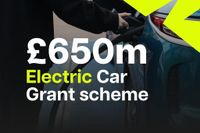In a significant move aimed at accelerating the United Kingdom’s transition to greener transport, the government has expanded its Electric Car Grant (ECG) to include 13 additional electric vehicle (EV) models from major manufacturers such as Nissan, Renault, and Vauxhall. The announcement, made public on August 9, 2025, means that drivers can now benefit from a £1,500 discount on a wider range of electric cars, making zero-emission motoring more accessible for households across the country.
This latest expansion brings the total number of ECG-eligible models to 17, following the earlier inclusion of six Citroën EVs in the scheme announced just days prior. The grant, which is part of a £650 million government investment under the broader £4.5 billion Plan for Change, is designed to tackle one of the most persistent barriers to EV adoption: upfront cost. According to the Department for Transport, the discounts are applied automatically at the point of sale, requiring no paperwork from customers—a welcome simplification for buyers eager to make the switch.
The new qualifying models span some of the most recognizable names in the industry. The list includes the Alpine A290, Renault Megane, Renault 4, Renault 5, Renault Scenic, Nissan Micra, Nissan Ariya (available from August 13, 2025), and the entire Vauxhall electric line-up, such as the Corsa Electric, Combo Life Electric, Astra Electric, Mokka Electric, Frontera Electric, and Grandland Electric. These join the Citroën ë-C3, ë-C3 Aircross, ë-C4, ë-C5, ë-C5 Aircross, and ë-Berlingo, all of which were approved for the grant earlier in the week.
Transport Secretary Heidi Alexander underscored the government’s commitment to supporting both drivers and the broader economy. "With discounts on seventeen car models announced this week alone, we’re delivering on our promise to make it easier and cheaper for families to go electric," Alexander stated, as reported by Fleet World. "This is about backing drivers, putting money back into people’s pockets and creating the jobs and growth that will drive Britain forward, delivering on our Plan for Change."
The ECG is targeted at vehicles with an initial list price up to £37,000, ensuring that support is focused on the most affordable options. The grant’s eligibility criteria are stringent: vehicles must meet technical and sustainability standards, including holding a verified Science Based Target and demonstrating low carbon emissions in both vehicle assembly and battery cell production. Notably, this means that many brands from East Asia, including China, South Korea, and Japan, are currently unlikely to qualify. The government has published detailed guidance to help manufacturers navigate the application process, and more models are expected to be added as further applications are assessed.
The scheme’s impact is already being felt across the industry. Simon Williams, head of policy at the RAC, called the latest additions "yet more welcome news," emphasizing the expanded choice and value for consumers. "It’s also very positive to see other manufacturers that don’t meet the grant’s green production targets lowering their prices. Those looking to make the switch now have a wider choice of better value vehicles than ever before. This can only help speed up the transition to electric motoring," Williams told Fleet World.
Manufacturers have also responded enthusiastically. Adam Wood, managing director of Renault UK, highlighted the grant’s role in democratizing EV ownership: "The availability of the ECG across our entire electric car range has potential to significantly accelerate this, ensuring customers benefit from greater value and giving them the confidence that it’s time to switch to electric."
James Taylor, managing director of Nissan Motor GB, echoed this optimism, describing the government’s flagship scheme as "a clear signal to both customers and manufacturers that they are prioritising the uptake of electric vehicles in the UK and on providing affordable options to consumers." Taylor added, "Nissan has always been an electric vehicle pioneer and this announcement is an exciting step in the UK’s electrification journey. Micra and Ariya are first and we have three new EVs on their way, including the all-electric British-built Leaf, which will go on sale later this year."
Steve Catlin, managing director of Vauxhall, expressed similar sentiments: "We welcome the support of the Electric Car Grant for every electric model in the Vauxhall line-up – including those manufactured here at our Ellesmere Port plant – and hope this will enable more British motorists to enjoy the benefits of switching to electric."
The ECG is not just about lowering purchase prices. It’s part of a multi-pronged approach to support the UK’s EV ecosystem, which also includes a £63 million package to expand charging infrastructure and reduce the cost of charging at home. The government reports that there are already more than 82,000 public chargepoints available, with over 100,000 expected in the coming years. This infrastructure build-out is intended to give drivers the confidence needed to make the leap to electric vehicles, addressing another key concern for potential buyers.
Industry analysts are already noting a surge in consumer interest. John Veichmanis, CEO at Carwow Group, pointed to a 124% jump in demand for EVs under £37,000 on their platform in the week following the ECG announcement. "Interest in already-approved models has surged, and we expect these newly added vehicles to draw immediate attention. Car-buying decisions don’t happen overnight, they often take months, so early clarity on eligible models is crucial. By lowering upfront costs, the grant plays a pivotal role in turning EV curiosity into commitment," Veichmanis told GB News.
The ECG also dovetails with the government’s Zero Emission Vehicle (ZEV) Mandate, which requires manufacturers to sell increasing percentages of zero-emission vehicles each year. Changes to the mandate, along with new trade deals with the US, India, and the European Union, are intended to give the UK automotive sector the stability and confidence it needs to invest and grow, protecting jobs in the process.
With more models likely to be approved in the coming weeks and a growing infrastructure to support them, the UK’s electric vehicle landscape is changing rapidly. The government’s approach—combining direct financial incentives, industry collaboration, and infrastructure investment—aims to position the country as a leader in the global shift to electric mobility.
For British motorists, the message is clear: the road to electric is being paved with greater affordability, more choices, and fewer hurdles than ever before.



